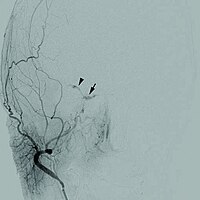
Photo from wikipedia
Early S100B protein serum elevation is associated with poor prognosis in patients with ruptured brain arteriovenous malformations (BAVM). The purpose of this study is to determine whether a secondary elevation… Click to show full abstract
Early S100B protein serum elevation is associated with poor prognosis in patients with ruptured brain arteriovenous malformations (BAVM). The purpose of this study is to determine whether a secondary elevation of S100B is associated with early complications or poor outcome in this population. This is a retrospective study of patients admitted for BAVM rupture. A secondary increase of S100B was defined as an absolute increase by 0.1 μg/L within 30 days of admission. Fisher’s and unpaired t tests followed by multivariate analysis were performed to identify markers associated with this increase. Two hundred and twenty-one ruptures met inclusion criteria. Secondary S100B protein serum elevation was found in 17.1% of ruptures and was associated with secondary infarction (p < 0.001), vasospasm-related infarction (p < 0.001), intensive care (p = 0.009), and hospital length of stay (p = 0.005), but not with early rebleeding (p = 0.07) or in-hospital mortality (p = 0.99). Secondary infarction was the only independent predictor of secondary increase of S100B (OR 9.9; 95% CI (3–35); p < 0.001). Secondary elevation of S100B protein serum levels is associated with secondary infarction in ruptured brain arteriovenous malformations.
Journal Title: Molecules
Year Published: 2020
Link to full text (if available)
Share on Social Media: Sign Up to like & get
recommendations!